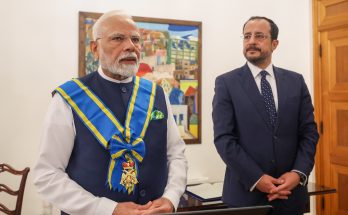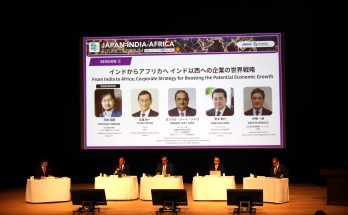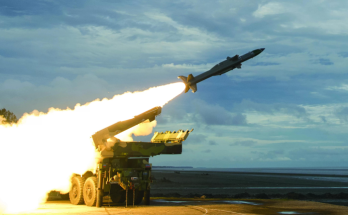 Ahead of the 17th BRICS summit in Rio de Janeiro, Centre for Global India Insights, in partnership with the Embassy of Brazil in India, organised a conference titled “BRICS in Rio: Shaping an Inclusive and Sustainable World Order,” at India International Centre in New Delhi on June 20, 2025. Mr Dammu Ravi, India’s BRICS Sherpa, Secretary (ER) in India’s Ministry of External Affairs, delivered the keynote address which focused on the pivotal role of BRICS+ in providing viable solutions for challenges faced by the Global South.
Ahead of the 17th BRICS summit in Rio de Janeiro, Centre for Global India Insights, in partnership with the Embassy of Brazil in India, organised a conference titled “BRICS in Rio: Shaping an Inclusive and Sustainable World Order,” at India International Centre in New Delhi on June 20, 2025. Mr Dammu Ravi, India’s BRICS Sherpa, Secretary (ER) in India’s Ministry of External Affairs, delivered the keynote address which focused on the pivotal role of BRICS+ in providing viable solutions for challenges faced by the Global South.
The panel featured ambassadors and eminent experts as speakers: Brazil’s Ambassador to India Kenneth Félix Haczynski da Nóbrega, Russia’s Ambassador to India Denis Alipov, Indonesia Ambassador Ina Hagniningtyas Krisnamurthi, Egypt’s Ambassador Kamel Zayed Kamel Galal and FICCI Director General Ms Jyoti Vij. The conference, moderated by Manish Chand, CEO, CGII, focused on the evolving agenda of the BRICS summit in Rio on July 6-7, 2025.
The conversation revolved around major geopolitical challenges, the urgency of reforming multilateral institutions, economic coordination within BRICS and with the broader Global South, the push for local currency trade, and sustainable development. Speakers reflected on the centrality of BRICS as a counterweight to Western-dominated frameworks and reaffirmed their respective countries’ commitment to democratic, inclusive, and sovereignty-respecting global governance. The discussion also underlined the importance of the upcoming Indian presidency in 2026 in advancing these priorities.
The India Way
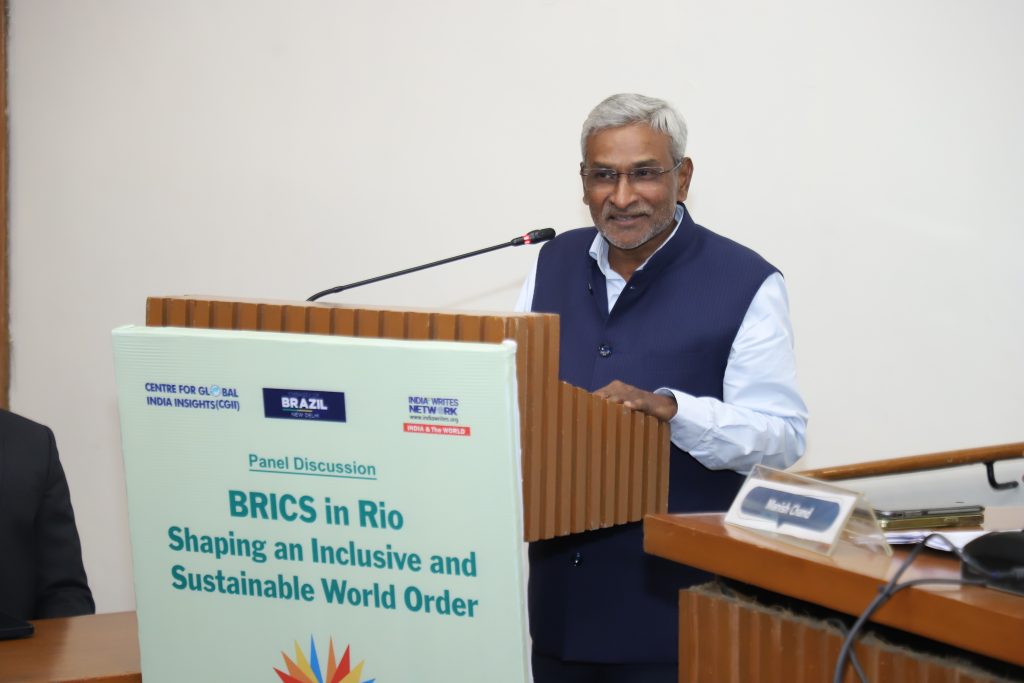
At the conference, eminent diplomats and experts voiced optimism about a bigger role for BRICS in shaping an inclusive world order by promoting interests of the Global South, and underlined the need for greater focus to combat terrorism.
Looking ahead, India, which will take over the BRICS gavel from Brazil, stressed on prioritising “scalable, cooperative projects in areas of financial inclusion, bridging digital divide and clean energy.
“BRICS has to get its act together and find solutions for the Global South. This requires commitment, a lot of hard work, and to be able to look deep into those issues, into the future,” said Mr Dammu Ravi, India’s BRICS sherpa and Secretary (Economic Relations) in India’s Ministry of External Affairs.
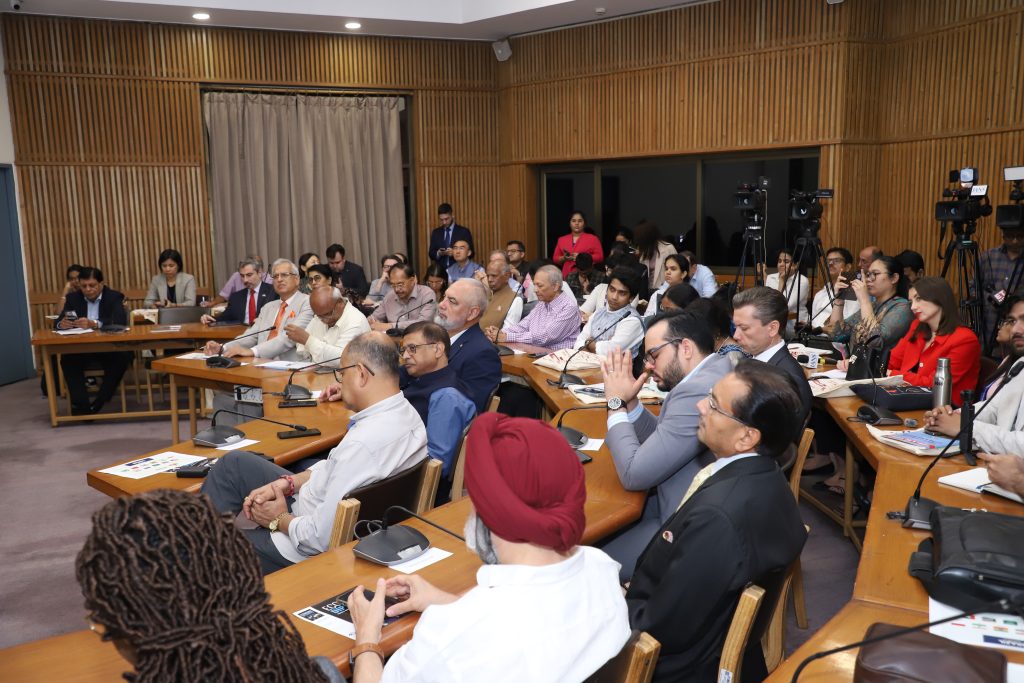
Mr Ravi underlined India’s growing stakes in shaping BRICS as both a development platform and a geopolitical force. “We are not just participants — we are contributors to the very direction BRICS takes,” he noted. He emphasized that India’s successful development models — particularly in poverty alleviation, financial inclusion, and digital public infrastructure — should be viewed as templates for wider application across the Global South.
Mr Ravi positioned BRICS as a counterweight to the conditionalities often associated with traditional multilateral development banks like the World Bank and the IMF. He praised the New Development Bank’s non-prescriptive lending model, which he said is especially valuable for countries seeking sovereign policy space.
“In this conflicted world of egos and competing interests, we need robust multilateralism and consensus-building. And this is where expanding multilateral groupings like BRICS can play a pivotal role in infusing hope in despairing times and in offering viable solutions to cross-cutting challenges,” said Mr Chand.
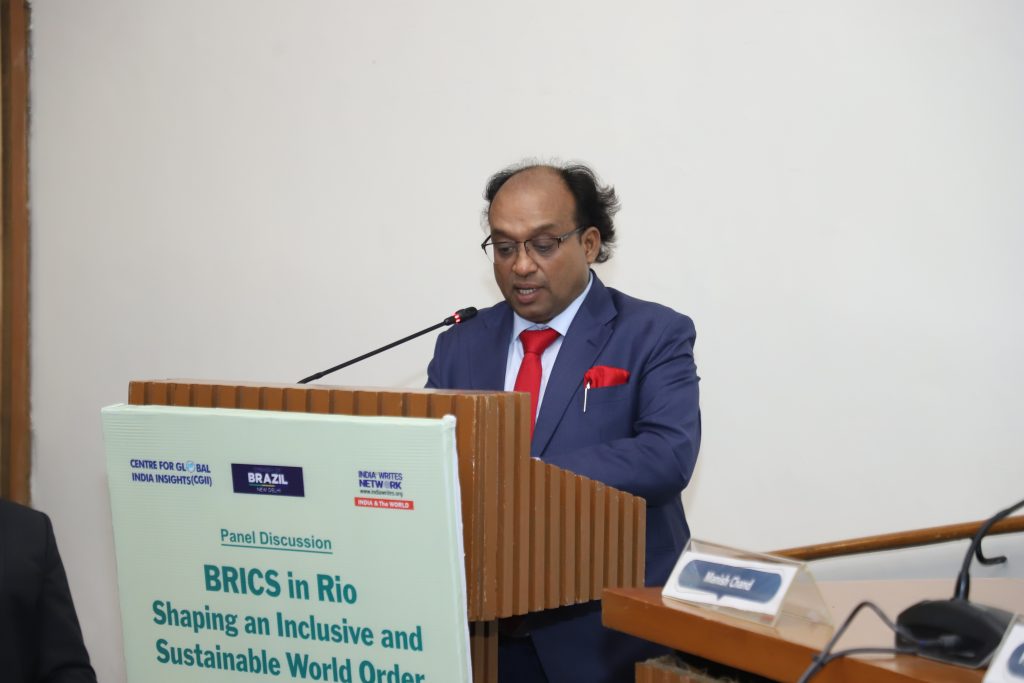 “The Rio summit will mark the ongoing ascendance of the Global South in the international arena. We hope that the upcoming Summit in Rio de Janeiro will be an opportunity to strengthen BRICS’ role as a platform to voice the concerns and interests of the Global South,” he said.
“The Rio summit will mark the ongoing ascendance of the Global South in the international arena. We hope that the upcoming Summit in Rio de Janeiro will be an opportunity to strengthen BRICS’ role as a platform to voice the concerns and interests of the Global South,” he said.
“The expanded BRICS holds out the promise of reform of international institutions with inclusiveness, with the Global South exercising effective influence on its reconfiguration,” said Brazil’s envoy Nobrega. “Despite the mistaken impressions of some, BRICS is not working against anyone, but exclusively in favour of the sustainable development of its members, as well as for the reform of global governance institutions.”
BRICS, originally comprising Brazil, Russia, India, China, and South Africa, expanded in 2024 to include Egypt, Ethiopia, Iran, and the United Arab Emirates, with Indonesia joining in 2025.
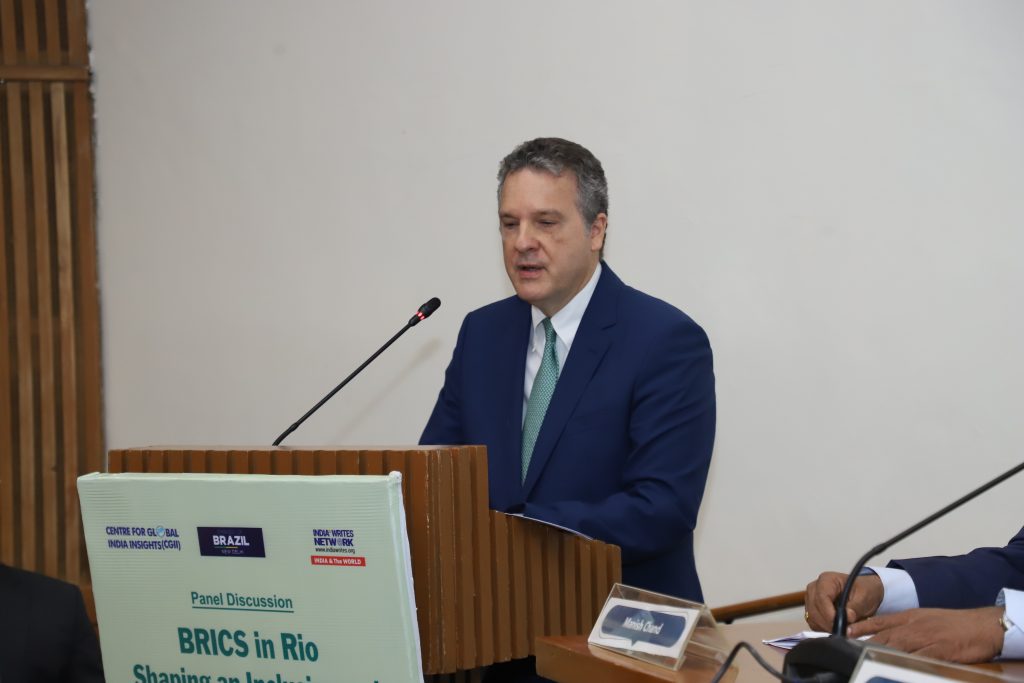 Alluding to a complex geopolitical environment, marked by increased polarization and distrust, Brazil’s Ambassador Nobrega underlined that the Brazilian presidency is seeking to update the work dynamics of the grouping while staying true to BRICS acquis and its gold standard: “pragmatic, patient and inclusive consensus building.”
Alluding to a complex geopolitical environment, marked by increased polarization and distrust, Brazil’s Ambassador Nobrega underlined that the Brazilian presidency is seeking to update the work dynamics of the grouping while staying true to BRICS acquis and its gold standard: “pragmatic, patient and inclusive consensus building.”
The motto of Brazilian chairship is “Strengthening Global South Cooperation for More Inclusive and Sustainable Governance.” The summit will culminate in two high-level declarations on financing the climate change regime and the governance of artificial intelligence.
BRICS Unity Against Terror
The envoys spoke in one voice on the need to enhance greater cooperation among the BRICS nations to combat terrorism.
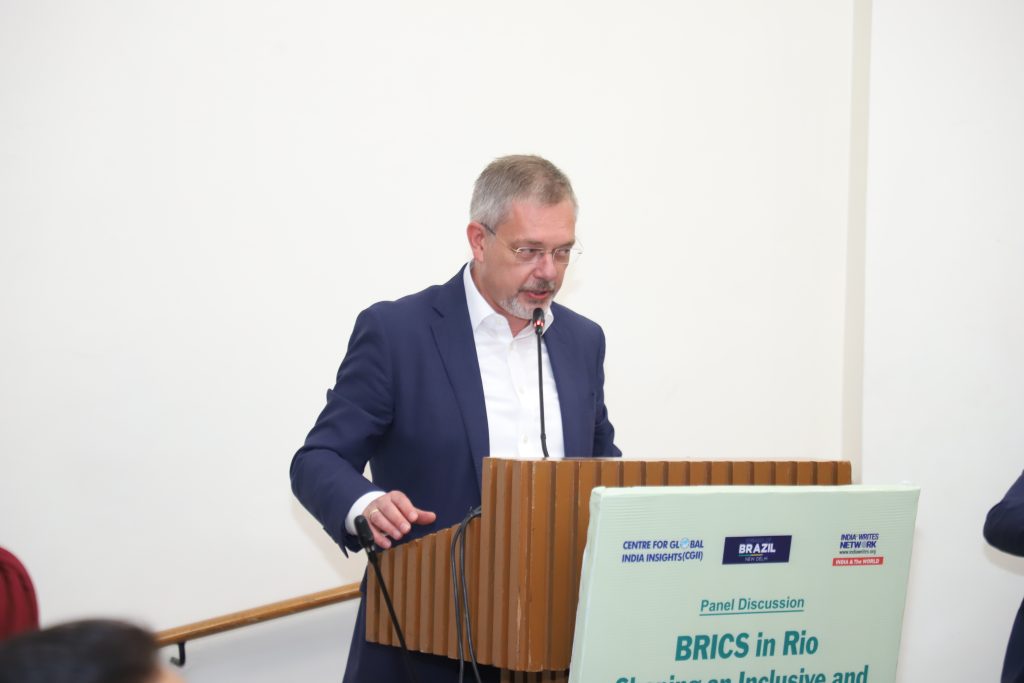 “We issued a strong condemnation. That shows BRICS can speak with one voice on core issues,” the Russian envoy said while alluding to the grouping’s response to terrorism, citing the April 22 Pahalgam attack in India. The grouping, he added, is evolving into a “more comprehensive and more representative” platform with its latest round of expansion.
“We issued a strong condemnation. That shows BRICS can speak with one voice on core issues,” the Russian envoy said while alluding to the grouping’s response to terrorism, citing the April 22 Pahalgam attack in India. The grouping, he added, is evolving into a “more comprehensive and more representative” platform with its latest round of expansion.
BRICS, originally comprising Brazil, Russia, India, China and South Africa, expanded in 2024 to include Egypt, Ethiopia, Iran and the United Arab Emirates, with Indonesia joining in 2025.
Promoting National Currency
Against the backdrop of US President Donald Trump accusing BRICS of promoting de-dollarisation, the envoys backed the expansion of the use of national currencies for intra-BRICS trade and pitched for deeper cooperation on economic issues. Enhancing the use of national currencies in settling intra-BRICS trade figured prominently in discussions, with all panellists backing the proposal, which is already being implemented by BRICS countries.
However, panelists found the idea of a BRICS common currency impractical. Mr Dammu Ravi clarified that discussions around a BRICS common currency are still at a very early stage. “Today, for now, we are only looking at trade settlement in national currencies. Harmonization of fiscal and monetary policies is very, very difficult to achieve, he said.
Expressing Russia’s support for Brazil’s BRICS presidency and its emphasis on enhancing cooperation among Global South nations, the Russian envoy commended efforts to diversify financial mechanisms, and backed expansion of the use of national currencies in intra-BRICS trade.
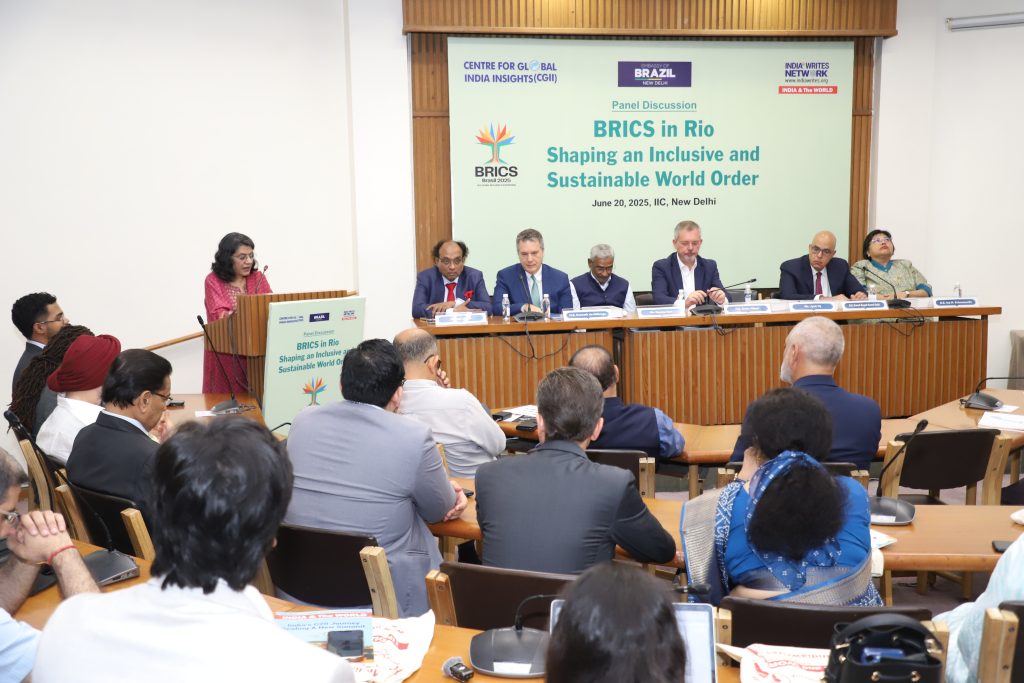 FICCI Secretary General Jyoti Vij outlined the role of BRICS Business Council in enhancing economic linkages among BRICS countries and underlined that the use of national currencies will greatly help businesses as it will help cut transaction costs.
FICCI Secretary General Jyoti Vij outlined the role of BRICS Business Council in enhancing economic linkages among BRICS countries and underlined that the use of national currencies will greatly help businesses as it will help cut transaction costs.
Ms. Vij brought the perspective of the private sector into a largely diplomatic conversation, underscoring the critical role that business communities play in shaping BRICS cooperation. Representing the Federation of Indian Chambers of Commerce and Industry (FICCI) and the Indian chapter of the BRICS Business Council, she emphasized that the Council functions as “the bridge between business and government” and has been instrumental in building sectoral synergies across BRICS nations.
Reforming global governance.
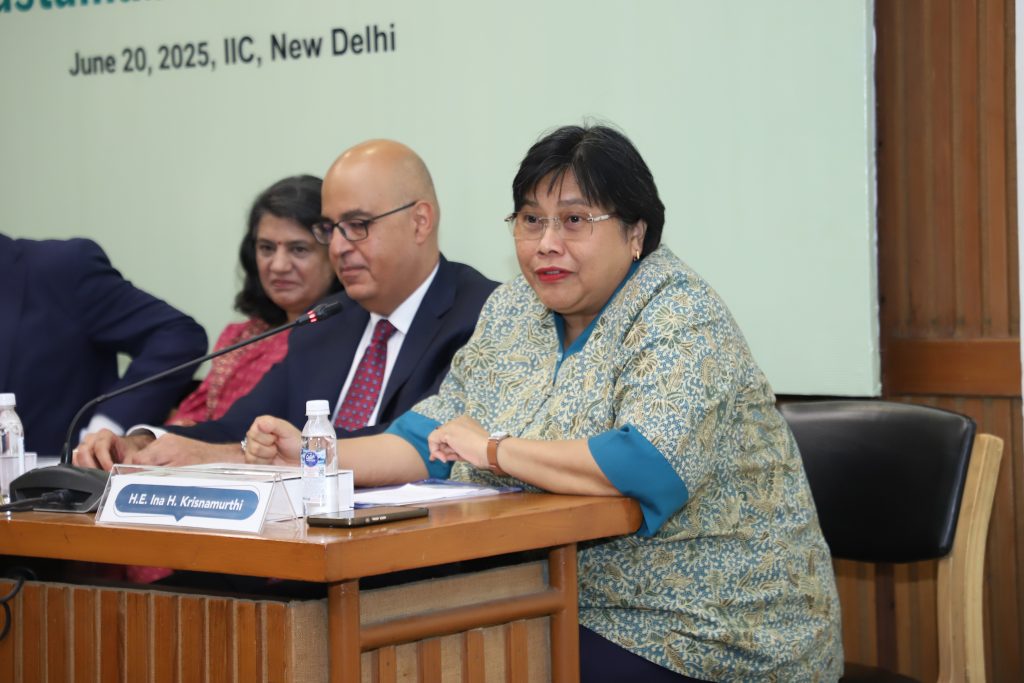 Accelerating reform of global governance institutions will figure prominently on the agenda of the BRICS summit in Rio. In this context, Indonesia’s Ambassador Krisnamurthi called for better representation of the Global South in multilateral institutions. “Right now, the Global South represents 85% of the world’s population and 39% of global GDP. Yet multilateral institutions do not reflect this reality.”
Accelerating reform of global governance institutions will figure prominently on the agenda of the BRICS summit in Rio. In this context, Indonesia’s Ambassador Krisnamurthi called for better representation of the Global South in multilateral institutions. “Right now, the Global South represents 85% of the world’s population and 39% of global GDP. Yet multilateral institutions do not reflect this reality.”
Ambassador Krishnamurthi also addressed the demographic and economic weight of the Global South, noting that China, India and ASEAN had lifted nearly 1.5 billion people into the middle class—a powerful mandate for inclusion. “Multilateral institutions must reflect this development,” she said, arguing that this demographic transformation demands a shift in global leadership structures.
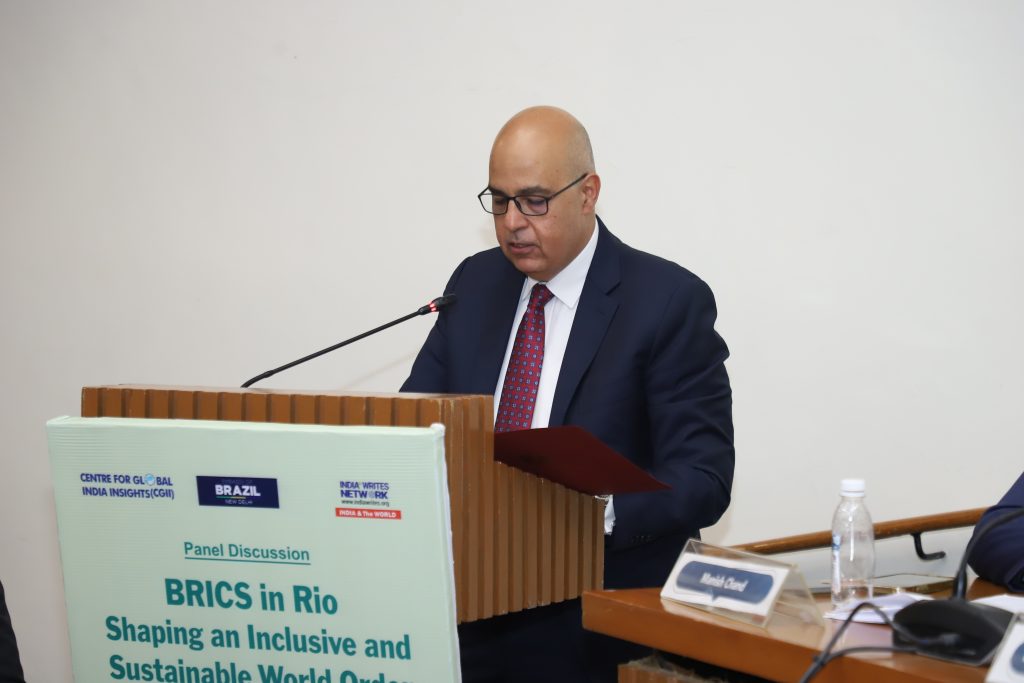 Outlining Cairo’s vision for the upcoming Rio summit, the Egyptian ambassador emphasized the need to “reform and strengthen the multilateral system in a way that reflects the evolving dynamics and rising role of developing countries.” “We are keen that the group should focus on areas of cooperation that enjoy consensus, rather than divisive issues,” said the Egyptian envoy.
Outlining Cairo’s vision for the upcoming Rio summit, the Egyptian ambassador emphasized the need to “reform and strengthen the multilateral system in a way that reflects the evolving dynamics and rising role of developing countries.” “We are keen that the group should focus on areas of cooperation that enjoy consensus, rather than divisive issues,” said the Egyptian envoy.
The Egyptian envoy called for the BRICS Rio Summit to produce “pragmatic, operational outcomes” that reflect consensus rather than polarizing positions. On regional priorities, he urged that BRICS’ final declaration “reflect the priorities and principles of the group regarding major international issues,” with a focus on Africa and Middle East conflicts—including the war in Gaza.
Author Profile
- India Writes Network (www.indiawrites.org) is an emerging think tank and a media-publishing company focused on international affairs & the India Story. Centre for Global India Insights is the research arm of India Writes Network. To subscribe to India and the World, write to editor@indiawrites.org. A venture of TGII Media Private Limited, a leading media, publishing and consultancy company, IWN has carved a niche for balanced and exhaustive reporting and analysis of international affairs. Eminent personalities, politicians, diplomats, authors, strategy gurus and news-makers have contributed to India Writes Network, as also “India and the World,” a magazine focused on global affairs.
Latest entries
 India and the WorldJune 23, 2025BRICS summit in Rio to focus on Global South, local currency trade
India and the WorldJune 23, 2025BRICS summit in Rio to focus on Global South, local currency trade Africa InsightsJune 11, 2025New Opportunities in India-Japan Cooperation in Africa
Africa InsightsJune 11, 2025New Opportunities in India-Japan Cooperation in Africa India and the WorldMay 23, 2025Post-Operation Sindoor, India reminds Turkey, China of concerns and sensitivities
India and the WorldMay 23, 2025Post-Operation Sindoor, India reminds Turkey, China of concerns and sensitivities India and the WorldMay 13, 2025Modi to Pakistan: India will not tolerate nuclear blackmail, zero tolerance for terror
India and the WorldMay 13, 2025Modi to Pakistan: India will not tolerate nuclear blackmail, zero tolerance for terror





